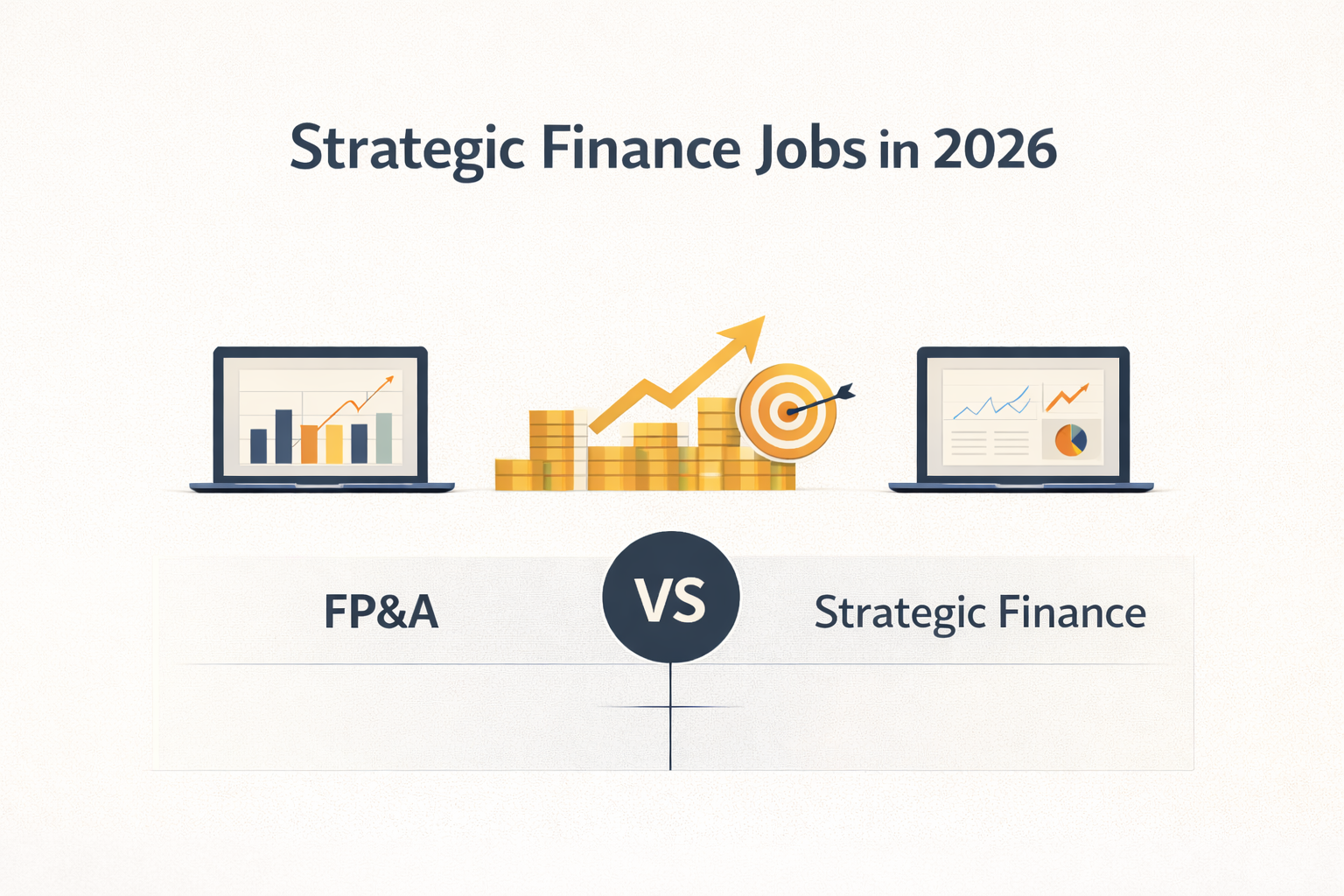Introduction: The Overlooked Backbone of Strategic Finance
In today’s corporate landscape, Strategic Finance is often portrayed as the glamorous, forward-thinking side of finance—one that drives long-term value, advises executives, and influences critical business decisions. When people ask “What is strategic finance?”, they usually imagine high-level forecasting, capital allocation debates, or M&A strategy.
Yet, beneath all that strategic insight lies a quieter, older discipline: accounting. Without it, strategic finance quickly loses its footing. No matter how sophisticated your FP&A (Financial Planning & Analysis) models are, they’re only as reliable as the accounting data feeding them.
Accounting may feel “back office” compared to strategic finance’s “boardroom” appeal, but forgetting it is a mistake. It’s the foundation on which all strategic decision-making rests.
Strategic Finance: Vision Without Blind Spots
Before diving deeper into accounting’s role, let’s clarify what is strategic finance.
At its core, strategic finance is about connecting the numbers to the narrative of a company’s growth and direction. It blends financial expertise, business acumen, and strategic thinking to answer questions like:
- Where should we invest next?
- How do we optimize capital allocation?
- What is our projected cash runway in different economic scenarios?
- How do we balance growth with profitability?
In practice, strategic finance teams often live within the FP&A function. They build budgets, run forecasts, perform scenario modeling, and partner with business units to track performance. But they don’t just report numbers—they interpret them, challenge assumptions, and provide actionable insights to leadership.
The challenge? Strategic finance is forward-looking, while accounting is backward-looking. One lives in projections, the other in historical truth. And without marrying those two worlds, companies risk making decisions based on flawed assumptions.
Why Accounting is the Strategic Finance Foundation
You can’t build a sound forecast if the underlying numbers are wrong or incomplete. This is where accounting becomes indispensable.
1. Data Integrity and Trust
All FP&A work starts with actuals—the historical financial results recorded by the accounting team. If the revenue recognition is inconsistent, expenses are misclassified, or accruals are inaccurate, the strategic finance forecast will inherit those errors.
Think of accounting as the calibration tool for your strategic finance “telescope.” If it’s misaligned, you’ll misinterpret what you’re seeing ahead.
2. Compliance and Accuracy
Strategic finance leaders often present to the board, investors, or lenders. Any misstatement—intentional or not—can damage credibility and even lead to legal repercussions. A strong accounting foundation ensures that every number presented is compliant with GAAP, IFRS, or whatever standards the company follows.
3. Nuanced Understanding of the Business
Accounting isn’t just about debits and credits; it’s about deeply understanding how money flows through the business. For example, an FP&A analyst may see a rise in “Cost of Goods Sold” and adjust the forecast. An accountant, however, might know that a one-time supplier payment skewed that number and that it’s not an ongoing trend.
The Disconnect: Why Accounting Gets Left Behind
Despite its importance, accounting is often underappreciated in strategic finance circles. This disconnect comes from a few common factors:
Strategic Finance’s Forward Bias
The FP&A world lives in the future—building next quarter’s forecast, projecting 3-year plans, running M&A models. Accounting’s backward-looking work can feel “less strategic” by comparison.
Tech and Automation Hype
With the rise of finance tech stacks—ERP integrations, BI tools, and AI forecasting—some leaders mistakenly think accounting accuracy is a solved problem. But automation is only as good as the inputs, and accounting judgment calls still require human expertise.
Different Communication Styles
Accountants often focus on precision and compliance. Strategic finance professionals emphasize business storytelling and decision-making. Without intentional collaboration, these communication styles can clash, leading to silos.
Case Study: When Accounting is Ignored in FP&A
Consider a SaaS company that decides to shift its sales compensation plan mid-year. The strategic finance team updates their FP&A model to reflect lower CAC (Customer Acquisition Cost) and higher ARR (Annual Recurring Revenue) growth. But they fail to check in with accounting.
Accounting, following revenue recognition rules, delays a portion of that ARR because the contract terms changed. The forecasted revenue growth doesn’t materialize on the income statement, leaving leadership blindsided.
The issue wasn’t a bad strategic decision—it was a lack of alignment between accounting and strategic finance.
Building a Stronger Bridge Between Accounting and Strategic Finance
To prevent these disconnects, companies should intentionally integrate the two disciplines.
1. Shared KPIs and Reporting
Create dashboards that blend historical accuracy with forward-looking metrics:
- Actuals vs. Forecast comparisons
- Revenue recognition schedule vs. booked sales
- Accrual-based expense tracking vs. budgeted spend
2. Monthly “Closing the Loop” Meetings
After the accounting close each month, FP&A and accounting should review results together. Discuss anomalies, reclassifications, and policy changes to ensure the forecast reflects reality.
3. Cross-Training
Give FP&A analysts basic accounting training (and vice versa). Understanding the other team’s constraints fosters mutual respect and better collaboration.
4. Tech That Serves Both Teams
Adopt systems that connect actuals to forecasts without creating data silos. An integrated ERP + planning tool ensures accounting adjustments automatically flow into strategic finance models.
The Strategic Finance Mindset Shift
For strategic finance leaders, embracing accounting isn’t about becoming an accountant—it’s about seeing accurate historical data as a strategic asset.
A forecast is only as good as the assumptions behind it. Those assumptions rest on actuals, and actuals rest on accounting. By investing in accounting accuracy, you’re effectively raising the quality of every decision you make.
This mindset shift changes the dynamic from:
“Accounting is compliance”
to
“Accounting is the single source of truth that makes our strategy credible.”
Real-World Examples of Accounting Elevating Strategic Finance
M&A Due Diligence
In acquisitions, strategic finance models often include synergies, integration costs, and revenue projections. But without clean historical financials, valuation can swing wildly—sometimes killing deals.
Cash Flow Optimization
FP&A might forecast a certain cash runway, but accounting’s insight into payment terms, unbilled revenue, or accrued expenses can materially change the timeline—sometimes buying months of breathing room.
Budget Discipline
Accounting teams track actual spend against budget in granular detail. This gives strategic finance leaders real-time insight into whether cost control measures are working.
Common Pitfalls When Accounting is Sidelined
- Forecast vs. Actual Gaps that erode executive trust.
- Compliance Risks from misstated or misunderstood figures.
- Missed Trends due to unrecognized accounting nuances (e.g., deferred revenue, prepayments).
- Overreliance on Models without validating inputs against reality.
Future of Strategic Finance: Accounting’s Role Will Grow
As the role of strategic finance evolves, accounting will become even more critical:
- Regulatory Complexity: Global expansion means navigating multiple accounting standards.
- Investor Scrutiny: Public markets and PE firms demand tighter alignment between projections and actuals.
- AI in FP&A: Machine learning tools need clean, accurate historical data to train models effectively.
The irony? The more advanced strategic finance becomes, the more it depends on accounting fundamentals.
Conclusion: The Case for Remembering Accounting
Strategic finance is about shaping the future of the business. But you can’t shape the future without understanding the past—and that past lives in accounting.
Whether you’re building complex FP&A models, advising on M&A, or guiding capital allocation, the accuracy and reliability of your work rest squarely on the shoulders of accounting.
So the next time someone asks, “What is strategic finance?”, you can answer:
“It’s forward-looking financial leadership, built on the solid ground of accounting discipline.”
Neglecting accounting in strategic finance is like building a skyscraper on sand. You might have a stunning vision, but without a solid foundation, it won’t stand for long.






.png)

